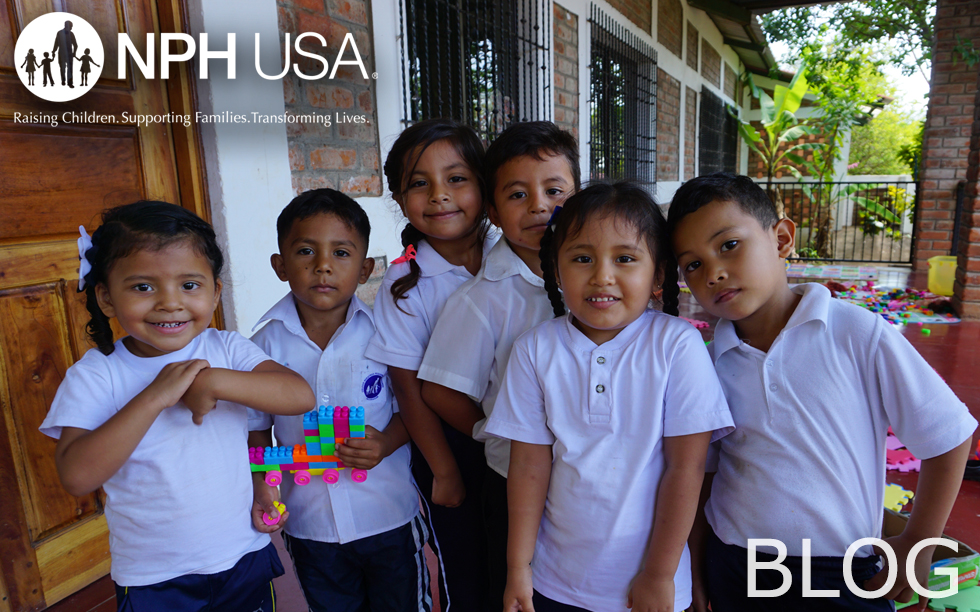I was fortunate to visit the NPH Honduras ranch for the first time with 22 children and adults from the Northwest this past July. Before the trip, I’d heard dozens of first-hand accounts that NPH changed their lives. I had high expectations.
My favorite morning was spent with first graders in Montessori class. We attended open air PE class, where they laughed at my limbo efforts. We snacked on oranges, then went inside. The pequeños kept quiet and knew what to expect. At tables, the assistant teacher handpicked flash card sets, tailoring the exercise to fit each student’s reading level. They wanted me to watch them read their flash cards. One boy began writing in his writing book. I sat with this precious boy as he wrote. Next, the teacher gathered the pequeños by the bulletin board where she taught Spanish.
The first moment I decided NPH Honduras is better than advertised was when I was looking around the perimeter of the classroom and I saw a red concrete-like floor, faint green walls and high ceilings. I focused on the Montessori style stations, equipped with wooden shelves of library books, blocks, abacuses, flags, flashcards, writing books. Maps, posters and children’s art hung on the walls. The variety of materials appealed to sensory, visual and auditory learning styles. The stations incorporated math, Spanish, English, reading, writing, religion, geography, history and biology. This classroom wasn’t as pretty or new as the Bellevue classrooms I’ve seen. But it functioned effectively. This classroom was equipped to help these pequeños develop order, concentration, coordination and independence. Both teachers had a tighter grip on the pequeños’ attention than I saw in classrooms at home. That was the moment I realized my high expectations of NPH were exceeded. These pequeños are getting a good education that will serve them years after they depart the ranch.
Other lessons I learned:
- It is possible for hundreds of children to be happy and well behaved at one time. I saw the effects that love, caring and acceptance have on children who once struggled to survive. I saw children play, study and do chores. It was heart-warming to give hugs and watch youngsters jockey to hold my hand, ask me to blow up their balloons and give high fives.
- NPH always has a good reason. Our travel group did not always understand a few shortcomings and rules at first. But NPH staff answered our questions and justified their priorities and allocation of resources. The extra services we wished could be offered were unavailable because of financial constraints.
- NPH’s programs have a deeper and more lasting impact than I had understood. Every NPH graduate gives back through a year of volunteer service. But I did not realize 20% of the current staff grew up at NPH because of donations during the 1980s and 1990s. I met an impressive sample: the head Montessori teacher, her husband, another teacher, a lawyer, 2 doctors and 2 alumnae from our Seattle Leadership Institute Program.
- Daily operations and programs allow each of the pequeños an opportunity to achieve his/her potential. Preschoolers and elementary students learn the Montessori method. All pequeños lead an orderly life with responsibilities of homework and twice daily chores. Children receive vocational training that will lead to a well paying job. Those who are capable can attend a university. Medical needs are met with a state of the art medical clinic and surgery center affiliated with NPH. Special needs pequeños receive individualized attention. NPH offers an alumnae network office where alumnae seek practical job-hunting help and emotional support.
- Vocational training programs and resources do double duty by fulfilling current needs. Pequeños from the NPH cobbler shop make all school shoes, and the shoes are impressive. Pequeños from the tailor shop create all school uniforms. Workshop trainees help maintain the facilities. Animals on the ranch provide dairy and meat.
- NPH is well respected in Honduras and has earned multiple awards. The government relies upon NPH to help vulnerable children and their families.










